Impact Analysis: World Cup Hosting on Tourism, Hospitality & Events
VerifiedAdded on 2023/06/18
|11
|2797
|338
Report
AI Summary
This report provides an executive summary and introduction defining the World Cup, discussing positive and negative issues for bidding countries, and outlining the report's aims. The analysis section covers the impacts on the tourism, hospitality, and events industries, including short-term effects on the hospitality sector, logistical challenges, and long-term influences on tourism. It also examines environmental impacts like carbon footprint and regeneration opportunities, as well as social impacts such as intangible benefits and policing. The conclusion summarizes the report's findings, and the recommendations section suggests ways to maximize benefits and minimize challenges for tourism, hospitality, events, the environment, and social aspects related to hosting the World Cup.
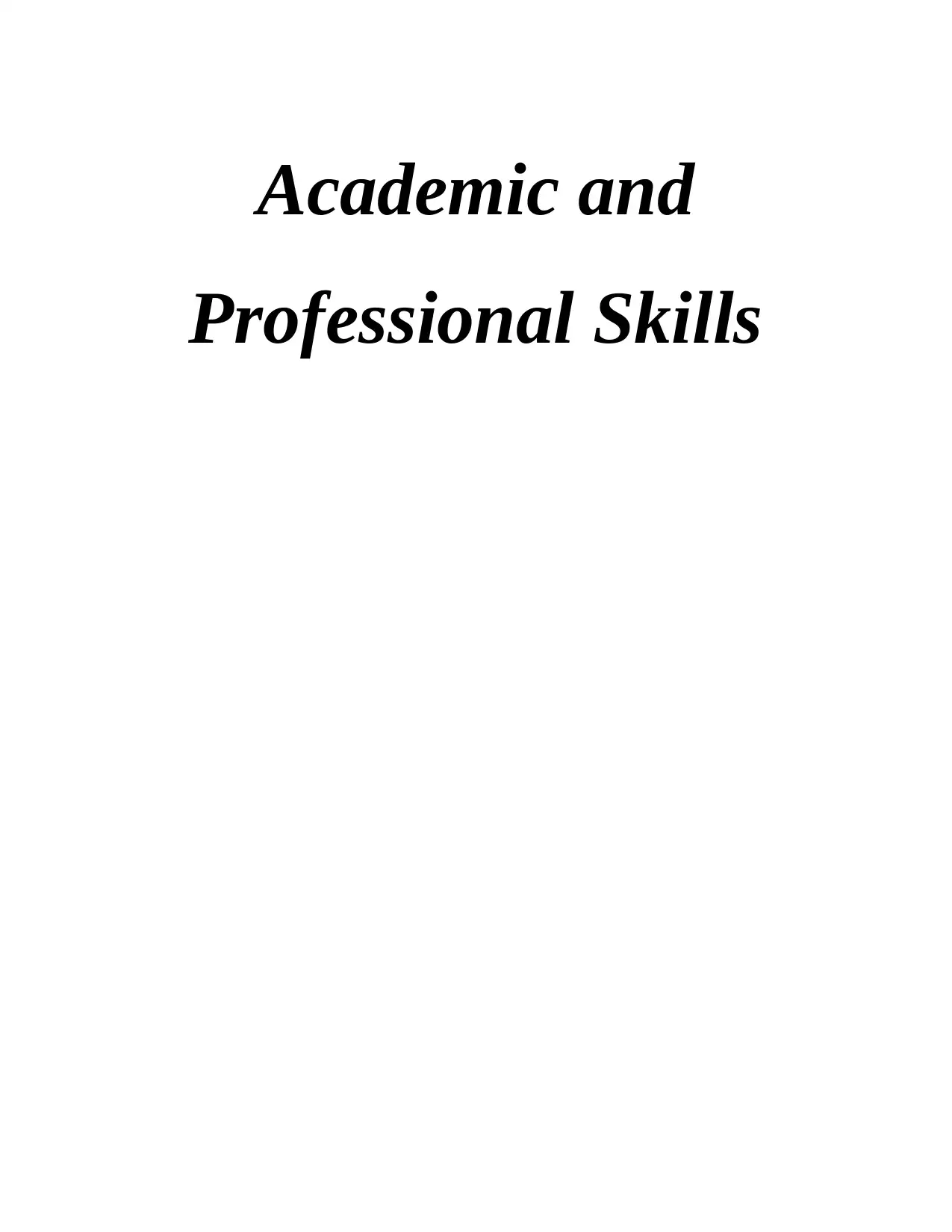
Academic and
Professional Skills
Professional Skills
Paraphrase This Document
Need a fresh take? Get an instant paraphrase of this document with our AI Paraphraser
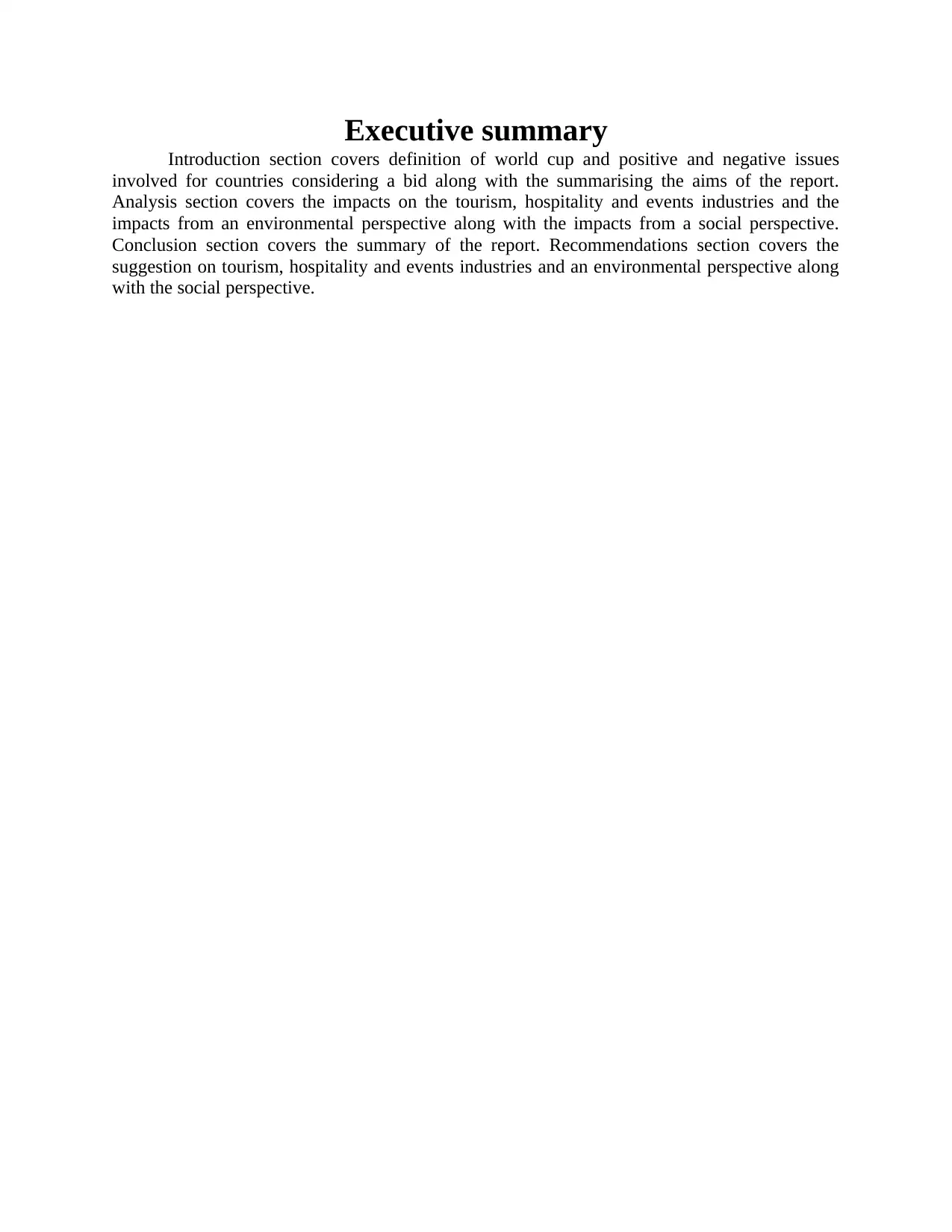
Executive summary
Introduction section covers definition of world cup and positive and negative issues
involved for countries considering a bid along with the summarising the aims of the report.
Analysis section covers the impacts on the tourism, hospitality and events industries and the
impacts from an environmental perspective along with the impacts from a social perspective.
Conclusion section covers the summary of the report. Recommendations section covers the
suggestion on tourism, hospitality and events industries and an environmental perspective along
with the social perspective.
Introduction section covers definition of world cup and positive and negative issues
involved for countries considering a bid along with the summarising the aims of the report.
Analysis section covers the impacts on the tourism, hospitality and events industries and the
impacts from an environmental perspective along with the impacts from a social perspective.
Conclusion section covers the summary of the report. Recommendations section covers the
suggestion on tourism, hospitality and events industries and an environmental perspective along
with the social perspective.
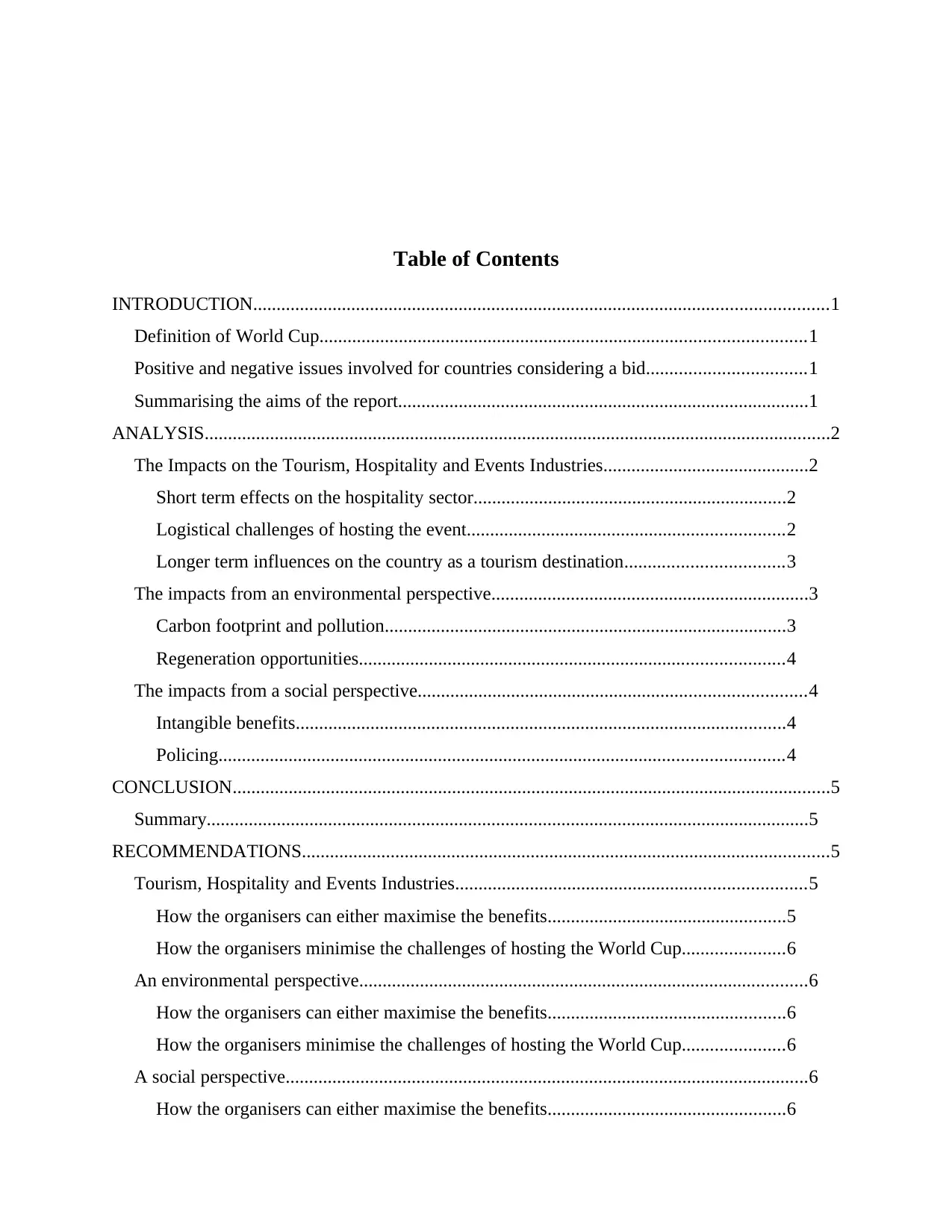
Table of Contents
INTRODUCTION...........................................................................................................................1
Definition of World Cup........................................................................................................1
Positive and negative issues involved for countries considering a bid..................................1
Summarising the aims of the report........................................................................................1
ANALYSIS......................................................................................................................................2
The Impacts on the Tourism, Hospitality and Events Industries............................................2
Short term effects on the hospitality sector...................................................................2
Logistical challenges of hosting the event....................................................................2
Longer term influences on the country as a tourism destination..................................3
The impacts from an environmental perspective....................................................................3
Carbon footprint and pollution......................................................................................3
Regeneration opportunities...........................................................................................4
The impacts from a social perspective...................................................................................4
Intangible benefits.........................................................................................................4
Policing.........................................................................................................................4
CONCLUSION................................................................................................................................5
Summary.................................................................................................................................5
RECOMMENDATIONS.................................................................................................................5
Tourism, Hospitality and Events Industries...........................................................................5
How the organisers can either maximise the benefits...................................................5
How the organisers minimise the challenges of hosting the World Cup......................6
An environmental perspective................................................................................................6
How the organisers can either maximise the benefits...................................................6
How the organisers minimise the challenges of hosting the World Cup......................6
A social perspective................................................................................................................6
How the organisers can either maximise the benefits...................................................6
INTRODUCTION...........................................................................................................................1
Definition of World Cup........................................................................................................1
Positive and negative issues involved for countries considering a bid..................................1
Summarising the aims of the report........................................................................................1
ANALYSIS......................................................................................................................................2
The Impacts on the Tourism, Hospitality and Events Industries............................................2
Short term effects on the hospitality sector...................................................................2
Logistical challenges of hosting the event....................................................................2
Longer term influences on the country as a tourism destination..................................3
The impacts from an environmental perspective....................................................................3
Carbon footprint and pollution......................................................................................3
Regeneration opportunities...........................................................................................4
The impacts from a social perspective...................................................................................4
Intangible benefits.........................................................................................................4
Policing.........................................................................................................................4
CONCLUSION................................................................................................................................5
Summary.................................................................................................................................5
RECOMMENDATIONS.................................................................................................................5
Tourism, Hospitality and Events Industries...........................................................................5
How the organisers can either maximise the benefits...................................................5
How the organisers minimise the challenges of hosting the World Cup......................6
An environmental perspective................................................................................................6
How the organisers can either maximise the benefits...................................................6
How the organisers minimise the challenges of hosting the World Cup......................6
A social perspective................................................................................................................6
How the organisers can either maximise the benefits...................................................6
⊘ This is a preview!⊘
Do you want full access?
Subscribe today to unlock all pages.

Trusted by 1+ million students worldwide

How the organisers minimise the challenges of hosting the World Cup......................6
References:.......................................................................................................................................7
References:.......................................................................................................................................7
Paraphrase This Document
Need a fresh take? Get an instant paraphrase of this document with our AI Paraphraser
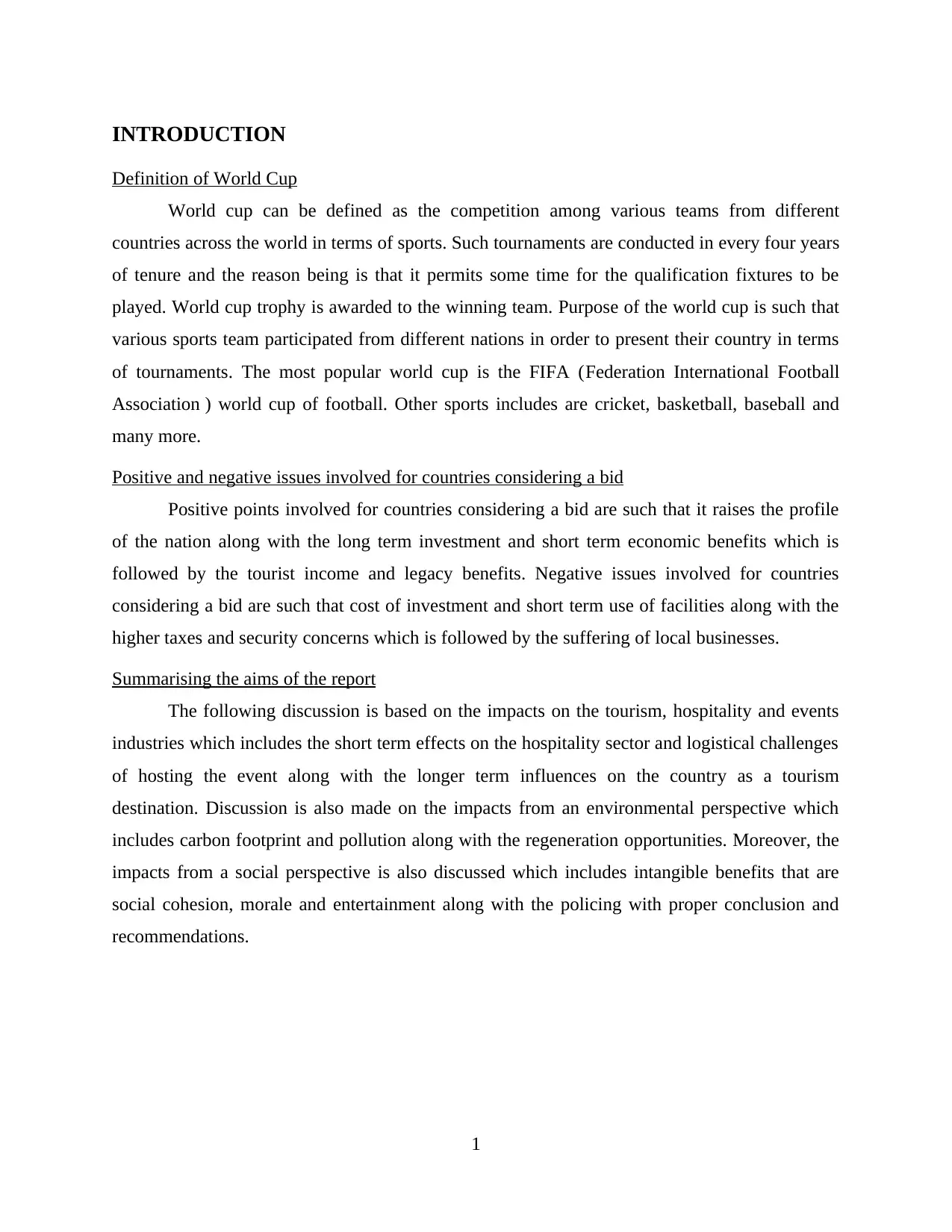
INTRODUCTION
Definition of World Cup
World cup can be defined as the competition among various teams from different
countries across the world in terms of sports. Such tournaments are conducted in every four years
of tenure and the reason being is that it permits some time for the qualification fixtures to be
played. World cup trophy is awarded to the winning team. Purpose of the world cup is such that
various sports team participated from different nations in order to present their country in terms
of tournaments. The most popular world cup is the FIFA (Federation International Football
Association ) world cup of football. Other sports includes are cricket, basketball, baseball and
many more.
Positive and negative issues involved for countries considering a bid
Positive points involved for countries considering a bid are such that it raises the profile
of the nation along with the long term investment and short term economic benefits which is
followed by the tourist income and legacy benefits. Negative issues involved for countries
considering a bid are such that cost of investment and short term use of facilities along with the
higher taxes and security concerns which is followed by the suffering of local businesses.
Summarising the aims of the report
The following discussion is based on the impacts on the tourism, hospitality and events
industries which includes the short term effects on the hospitality sector and logistical challenges
of hosting the event along with the longer term influences on the country as a tourism
destination. Discussion is also made on the impacts from an environmental perspective which
includes carbon footprint and pollution along with the regeneration opportunities. Moreover, the
impacts from a social perspective is also discussed which includes intangible benefits that are
social cohesion, morale and entertainment along with the policing with proper conclusion and
recommendations.
1
Definition of World Cup
World cup can be defined as the competition among various teams from different
countries across the world in terms of sports. Such tournaments are conducted in every four years
of tenure and the reason being is that it permits some time for the qualification fixtures to be
played. World cup trophy is awarded to the winning team. Purpose of the world cup is such that
various sports team participated from different nations in order to present their country in terms
of tournaments. The most popular world cup is the FIFA (Federation International Football
Association ) world cup of football. Other sports includes are cricket, basketball, baseball and
many more.
Positive and negative issues involved for countries considering a bid
Positive points involved for countries considering a bid are such that it raises the profile
of the nation along with the long term investment and short term economic benefits which is
followed by the tourist income and legacy benefits. Negative issues involved for countries
considering a bid are such that cost of investment and short term use of facilities along with the
higher taxes and security concerns which is followed by the suffering of local businesses.
Summarising the aims of the report
The following discussion is based on the impacts on the tourism, hospitality and events
industries which includes the short term effects on the hospitality sector and logistical challenges
of hosting the event along with the longer term influences on the country as a tourism
destination. Discussion is also made on the impacts from an environmental perspective which
includes carbon footprint and pollution along with the regeneration opportunities. Moreover, the
impacts from a social perspective is also discussed which includes intangible benefits that are
social cohesion, morale and entertainment along with the policing with proper conclusion and
recommendations.
1
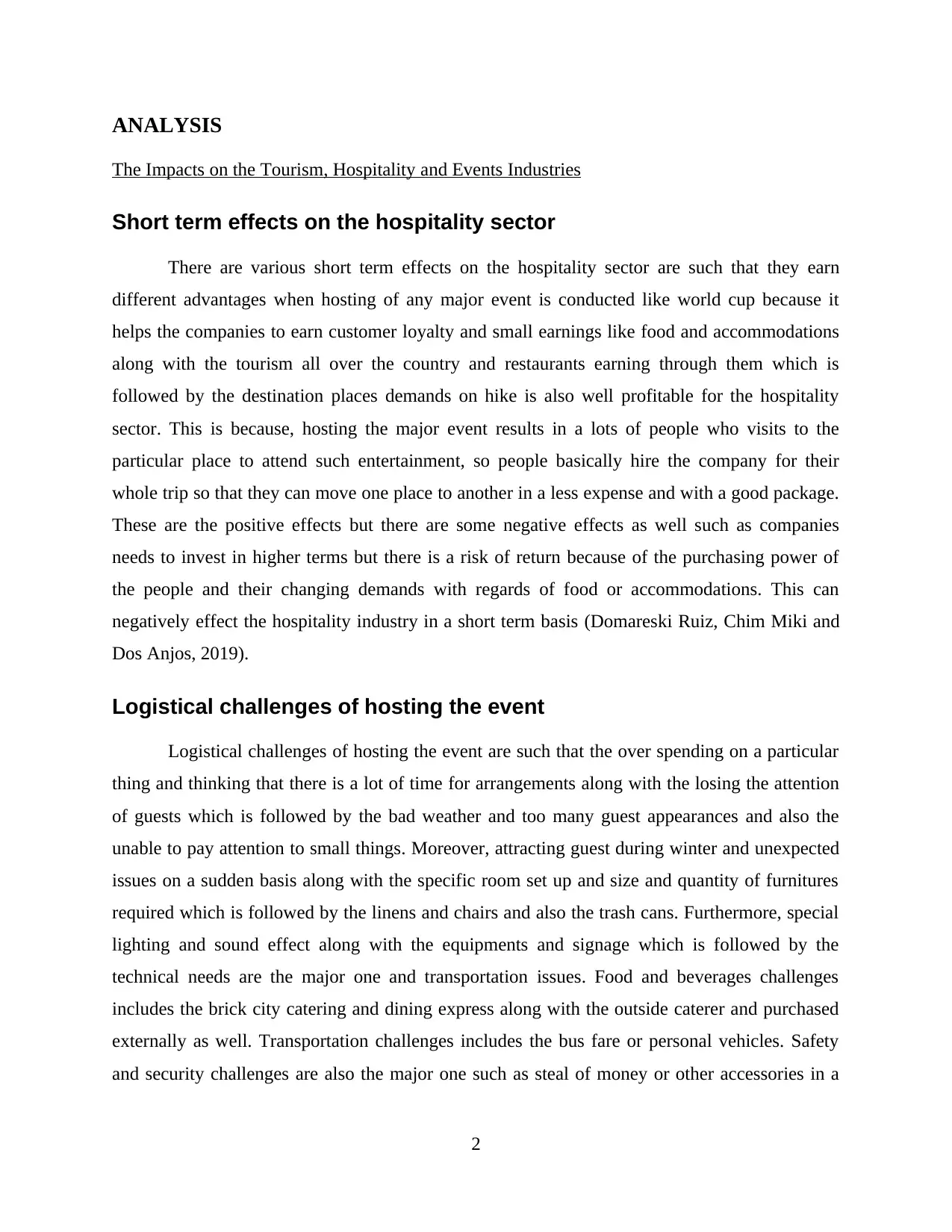
ANALYSIS
The Impacts on the Tourism, Hospitality and Events Industries
Short term effects on the hospitality sector
There are various short term effects on the hospitality sector are such that they earn
different advantages when hosting of any major event is conducted like world cup because it
helps the companies to earn customer loyalty and small earnings like food and accommodations
along with the tourism all over the country and restaurants earning through them which is
followed by the destination places demands on hike is also well profitable for the hospitality
sector. This is because, hosting the major event results in a lots of people who visits to the
particular place to attend such entertainment, so people basically hire the company for their
whole trip so that they can move one place to another in a less expense and with a good package.
These are the positive effects but there are some negative effects as well such as companies
needs to invest in higher terms but there is a risk of return because of the purchasing power of
the people and their changing demands with regards of food or accommodations. This can
negatively effect the hospitality industry in a short term basis (Domareski Ruiz, Chim Miki and
Dos Anjos, 2019).
Logistical challenges of hosting the event
Logistical challenges of hosting the event are such that the over spending on a particular
thing and thinking that there is a lot of time for arrangements along with the losing the attention
of guests which is followed by the bad weather and too many guest appearances and also the
unable to pay attention to small things. Moreover, attracting guest during winter and unexpected
issues on a sudden basis along with the specific room set up and size and quantity of furnitures
required which is followed by the linens and chairs and also the trash cans. Furthermore, special
lighting and sound effect along with the equipments and signage which is followed by the
technical needs are the major one and transportation issues. Food and beverages challenges
includes the brick city catering and dining express along with the outside caterer and purchased
externally as well. Transportation challenges includes the bus fare or personal vehicles. Safety
and security challenges are also the major one such as steal of money or other accessories in a
2
The Impacts on the Tourism, Hospitality and Events Industries
Short term effects on the hospitality sector
There are various short term effects on the hospitality sector are such that they earn
different advantages when hosting of any major event is conducted like world cup because it
helps the companies to earn customer loyalty and small earnings like food and accommodations
along with the tourism all over the country and restaurants earning through them which is
followed by the destination places demands on hike is also well profitable for the hospitality
sector. This is because, hosting the major event results in a lots of people who visits to the
particular place to attend such entertainment, so people basically hire the company for their
whole trip so that they can move one place to another in a less expense and with a good package.
These are the positive effects but there are some negative effects as well such as companies
needs to invest in higher terms but there is a risk of return because of the purchasing power of
the people and their changing demands with regards of food or accommodations. This can
negatively effect the hospitality industry in a short term basis (Domareski Ruiz, Chim Miki and
Dos Anjos, 2019).
Logistical challenges of hosting the event
Logistical challenges of hosting the event are such that the over spending on a particular
thing and thinking that there is a lot of time for arrangements along with the losing the attention
of guests which is followed by the bad weather and too many guest appearances and also the
unable to pay attention to small things. Moreover, attracting guest during winter and unexpected
issues on a sudden basis along with the specific room set up and size and quantity of furnitures
required which is followed by the linens and chairs and also the trash cans. Furthermore, special
lighting and sound effect along with the equipments and signage which is followed by the
technical needs are the major one and transportation issues. Food and beverages challenges
includes the brick city catering and dining express along with the outside caterer and purchased
externally as well. Transportation challenges includes the bus fare or personal vehicles. Safety
and security challenges are also the major one such as steal of money or other accessories in a
2
⊘ This is a preview!⊘
Do you want full access?
Subscribe today to unlock all pages.

Trusted by 1+ million students worldwide
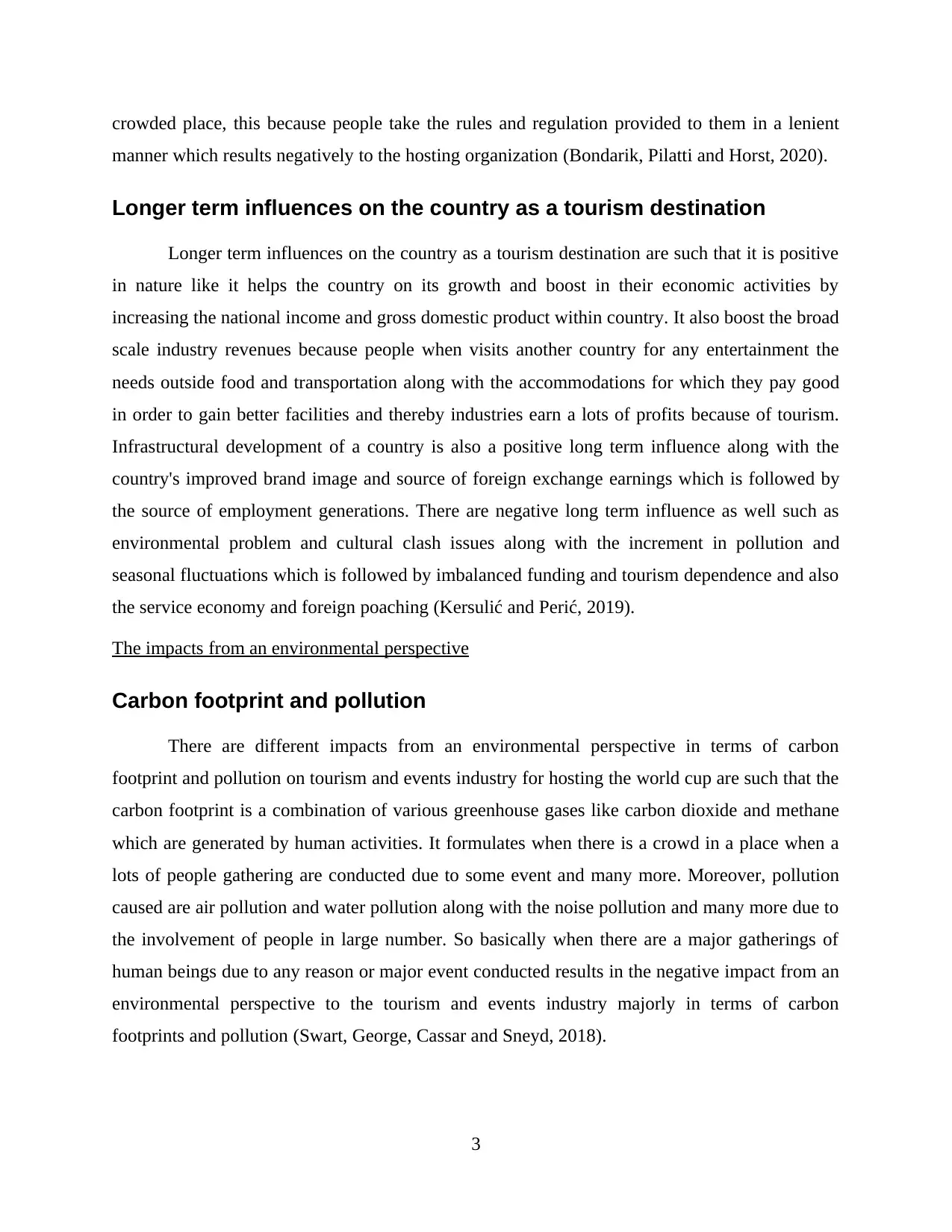
crowded place, this because people take the rules and regulation provided to them in a lenient
manner which results negatively to the hosting organization (Bondarik, Pilatti and Horst, 2020).
Longer term influences on the country as a tourism destination
Longer term influences on the country as a tourism destination are such that it is positive
in nature like it helps the country on its growth and boost in their economic activities by
increasing the national income and gross domestic product within country. It also boost the broad
scale industry revenues because people when visits another country for any entertainment the
needs outside food and transportation along with the accommodations for which they pay good
in order to gain better facilities and thereby industries earn a lots of profits because of tourism.
Infrastructural development of a country is also a positive long term influence along with the
country's improved brand image and source of foreign exchange earnings which is followed by
the source of employment generations. There are negative long term influence as well such as
environmental problem and cultural clash issues along with the increment in pollution and
seasonal fluctuations which is followed by imbalanced funding and tourism dependence and also
the service economy and foreign poaching (Kersulić and Perić, 2019).
The impacts from an environmental perspective
Carbon footprint and pollution
There are different impacts from an environmental perspective in terms of carbon
footprint and pollution on tourism and events industry for hosting the world cup are such that the
carbon footprint is a combination of various greenhouse gases like carbon dioxide and methane
which are generated by human activities. It formulates when there is a crowd in a place when a
lots of people gathering are conducted due to some event and many more. Moreover, pollution
caused are air pollution and water pollution along with the noise pollution and many more due to
the involvement of people in large number. So basically when there are a major gatherings of
human beings due to any reason or major event conducted results in the negative impact from an
environmental perspective to the tourism and events industry majorly in terms of carbon
footprints and pollution (Swart, George, Cassar and Sneyd, 2018).
3
manner which results negatively to the hosting organization (Bondarik, Pilatti and Horst, 2020).
Longer term influences on the country as a tourism destination
Longer term influences on the country as a tourism destination are such that it is positive
in nature like it helps the country on its growth and boost in their economic activities by
increasing the national income and gross domestic product within country. It also boost the broad
scale industry revenues because people when visits another country for any entertainment the
needs outside food and transportation along with the accommodations for which they pay good
in order to gain better facilities and thereby industries earn a lots of profits because of tourism.
Infrastructural development of a country is also a positive long term influence along with the
country's improved brand image and source of foreign exchange earnings which is followed by
the source of employment generations. There are negative long term influence as well such as
environmental problem and cultural clash issues along with the increment in pollution and
seasonal fluctuations which is followed by imbalanced funding and tourism dependence and also
the service economy and foreign poaching (Kersulić and Perić, 2019).
The impacts from an environmental perspective
Carbon footprint and pollution
There are different impacts from an environmental perspective in terms of carbon
footprint and pollution on tourism and events industry for hosting the world cup are such that the
carbon footprint is a combination of various greenhouse gases like carbon dioxide and methane
which are generated by human activities. It formulates when there is a crowd in a place when a
lots of people gathering are conducted due to some event and many more. Moreover, pollution
caused are air pollution and water pollution along with the noise pollution and many more due to
the involvement of people in large number. So basically when there are a major gatherings of
human beings due to any reason or major event conducted results in the negative impact from an
environmental perspective to the tourism and events industry majorly in terms of carbon
footprints and pollution (Swart, George, Cassar and Sneyd, 2018).
3
Paraphrase This Document
Need a fresh take? Get an instant paraphrase of this document with our AI Paraphraser
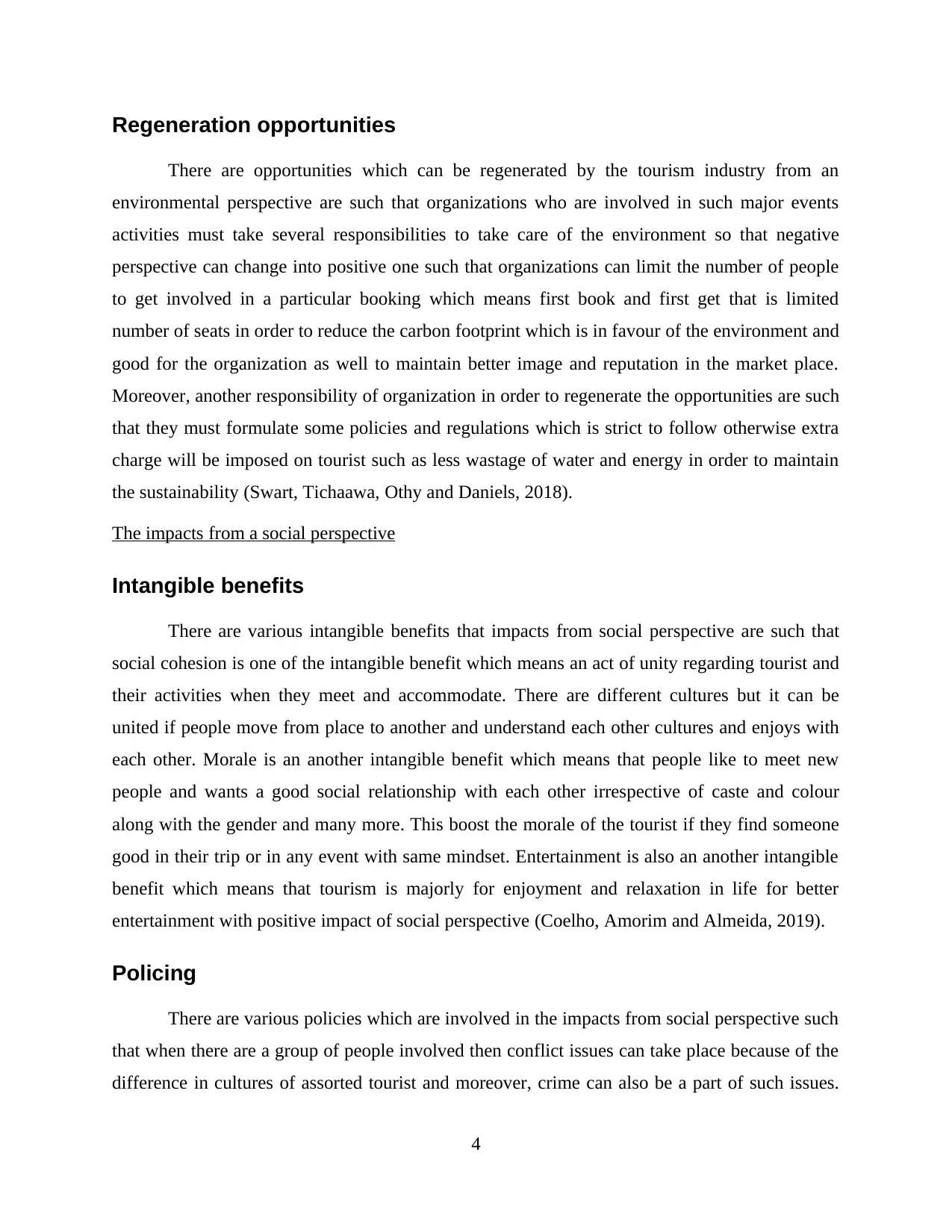
Regeneration opportunities
There are opportunities which can be regenerated by the tourism industry from an
environmental perspective are such that organizations who are involved in such major events
activities must take several responsibilities to take care of the environment so that negative
perspective can change into positive one such that organizations can limit the number of people
to get involved in a particular booking which means first book and first get that is limited
number of seats in order to reduce the carbon footprint which is in favour of the environment and
good for the organization as well to maintain better image and reputation in the market place.
Moreover, another responsibility of organization in order to regenerate the opportunities are such
that they must formulate some policies and regulations which is strict to follow otherwise extra
charge will be imposed on tourist such as less wastage of water and energy in order to maintain
the sustainability (Swart, Tichaawa, Othy and Daniels, 2018).
The impacts from a social perspective
Intangible benefits
There are various intangible benefits that impacts from social perspective are such that
social cohesion is one of the intangible benefit which means an act of unity regarding tourist and
their activities when they meet and accommodate. There are different cultures but it can be
united if people move from place to another and understand each other cultures and enjoys with
each other. Morale is an another intangible benefit which means that people like to meet new
people and wants a good social relationship with each other irrespective of caste and colour
along with the gender and many more. This boost the morale of the tourist if they find someone
good in their trip or in any event with same mindset. Entertainment is also an another intangible
benefit which means that tourism is majorly for enjoyment and relaxation in life for better
entertainment with positive impact of social perspective (Coelho, Amorim and Almeida, 2019).
Policing
There are various policies which are involved in the impacts from social perspective such
that when there are a group of people involved then conflict issues can take place because of the
difference in cultures of assorted tourist and moreover, crime can also be a part of such issues.
4
There are opportunities which can be regenerated by the tourism industry from an
environmental perspective are such that organizations who are involved in such major events
activities must take several responsibilities to take care of the environment so that negative
perspective can change into positive one such that organizations can limit the number of people
to get involved in a particular booking which means first book and first get that is limited
number of seats in order to reduce the carbon footprint which is in favour of the environment and
good for the organization as well to maintain better image and reputation in the market place.
Moreover, another responsibility of organization in order to regenerate the opportunities are such
that they must formulate some policies and regulations which is strict to follow otherwise extra
charge will be imposed on tourist such as less wastage of water and energy in order to maintain
the sustainability (Swart, Tichaawa, Othy and Daniels, 2018).
The impacts from a social perspective
Intangible benefits
There are various intangible benefits that impacts from social perspective are such that
social cohesion is one of the intangible benefit which means an act of unity regarding tourist and
their activities when they meet and accommodate. There are different cultures but it can be
united if people move from place to another and understand each other cultures and enjoys with
each other. Morale is an another intangible benefit which means that people like to meet new
people and wants a good social relationship with each other irrespective of caste and colour
along with the gender and many more. This boost the morale of the tourist if they find someone
good in their trip or in any event with same mindset. Entertainment is also an another intangible
benefit which means that tourism is majorly for enjoyment and relaxation in life for better
entertainment with positive impact of social perspective (Coelho, Amorim and Almeida, 2019).
Policing
There are various policies which are involved in the impacts from social perspective such
that when there are a group of people involved then conflict issues can take place because of the
difference in cultures of assorted tourist and moreover, crime can also be a part of such issues.
4
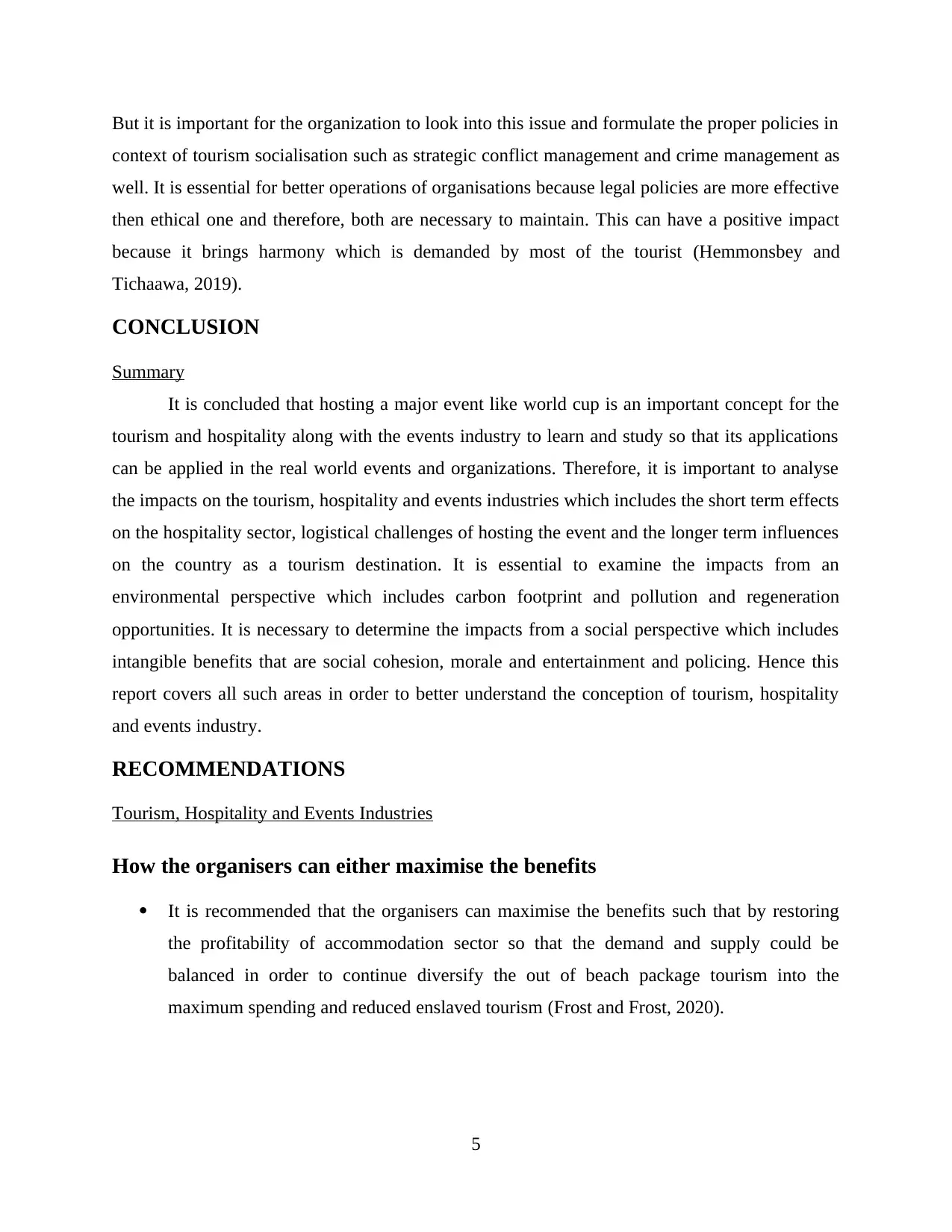
But it is important for the organization to look into this issue and formulate the proper policies in
context of tourism socialisation such as strategic conflict management and crime management as
well. It is essential for better operations of organisations because legal policies are more effective
then ethical one and therefore, both are necessary to maintain. This can have a positive impact
because it brings harmony which is demanded by most of the tourist (Hemmonsbey and
Tichaawa, 2019).
CONCLUSION
Summary
It is concluded that hosting a major event like world cup is an important concept for the
tourism and hospitality along with the events industry to learn and study so that its applications
can be applied in the real world events and organizations. Therefore, it is important to analyse
the impacts on the tourism, hospitality and events industries which includes the short term effects
on the hospitality sector, logistical challenges of hosting the event and the longer term influences
on the country as a tourism destination. It is essential to examine the impacts from an
environmental perspective which includes carbon footprint and pollution and regeneration
opportunities. It is necessary to determine the impacts from a social perspective which includes
intangible benefits that are social cohesion, morale and entertainment and policing. Hence this
report covers all such areas in order to better understand the conception of tourism, hospitality
and events industry.
RECOMMENDATIONS
Tourism, Hospitality and Events Industries
How the organisers can either maximise the benefits
It is recommended that the organisers can maximise the benefits such that by restoring
the profitability of accommodation sector so that the demand and supply could be
balanced in order to continue diversify the out of beach package tourism into the
maximum spending and reduced enslaved tourism (Frost and Frost, 2020).
5
context of tourism socialisation such as strategic conflict management and crime management as
well. It is essential for better operations of organisations because legal policies are more effective
then ethical one and therefore, both are necessary to maintain. This can have a positive impact
because it brings harmony which is demanded by most of the tourist (Hemmonsbey and
Tichaawa, 2019).
CONCLUSION
Summary
It is concluded that hosting a major event like world cup is an important concept for the
tourism and hospitality along with the events industry to learn and study so that its applications
can be applied in the real world events and organizations. Therefore, it is important to analyse
the impacts on the tourism, hospitality and events industries which includes the short term effects
on the hospitality sector, logistical challenges of hosting the event and the longer term influences
on the country as a tourism destination. It is essential to examine the impacts from an
environmental perspective which includes carbon footprint and pollution and regeneration
opportunities. It is necessary to determine the impacts from a social perspective which includes
intangible benefits that are social cohesion, morale and entertainment and policing. Hence this
report covers all such areas in order to better understand the conception of tourism, hospitality
and events industry.
RECOMMENDATIONS
Tourism, Hospitality and Events Industries
How the organisers can either maximise the benefits
It is recommended that the organisers can maximise the benefits such that by restoring
the profitability of accommodation sector so that the demand and supply could be
balanced in order to continue diversify the out of beach package tourism into the
maximum spending and reduced enslaved tourism (Frost and Frost, 2020).
5
⊘ This is a preview!⊘
Do you want full access?
Subscribe today to unlock all pages.

Trusted by 1+ million students worldwide
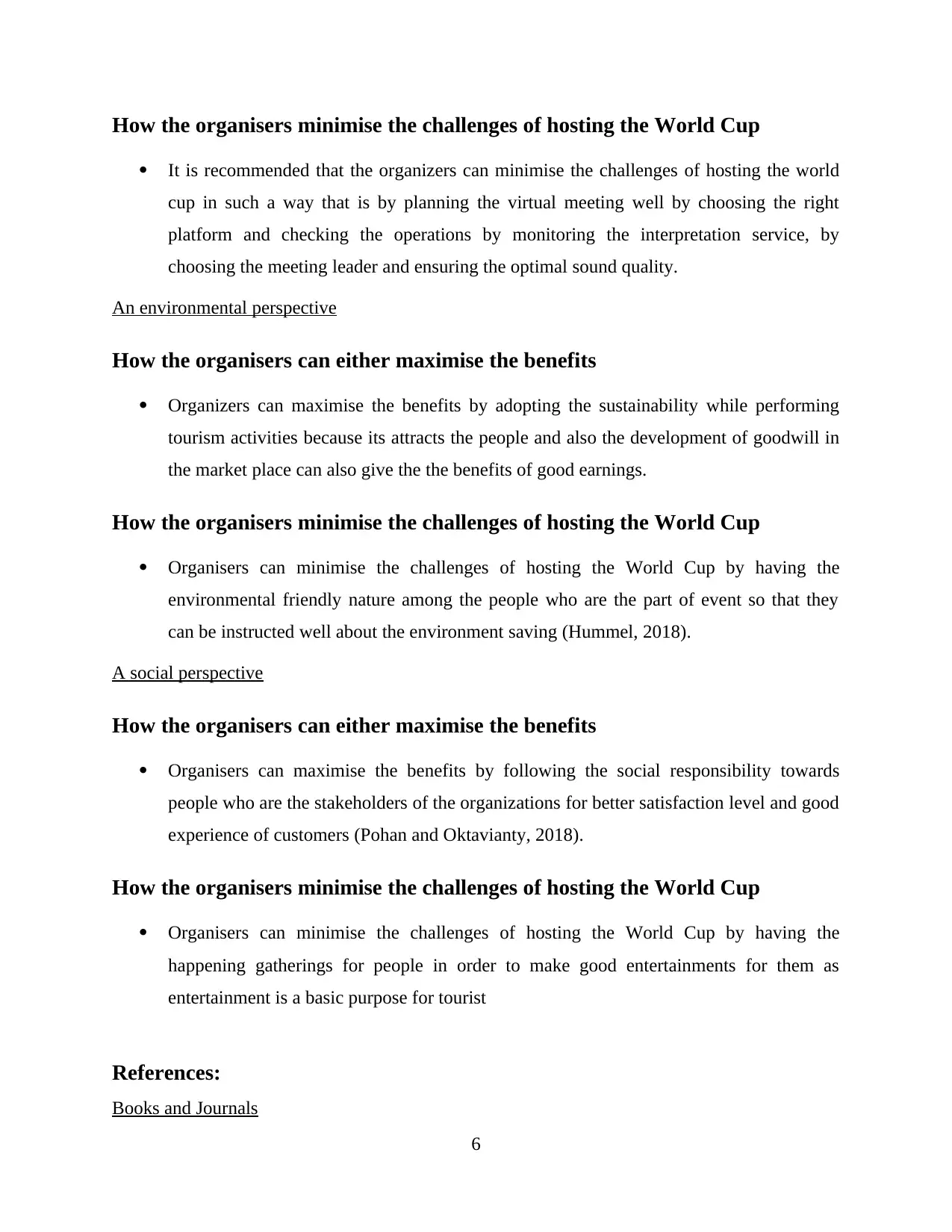
How the organisers minimise the challenges of hosting the World Cup
It is recommended that the organizers can minimise the challenges of hosting the world
cup in such a way that is by planning the virtual meeting well by choosing the right
platform and checking the operations by monitoring the interpretation service, by
choosing the meeting leader and ensuring the optimal sound quality.
An environmental perspective
How the organisers can either maximise the benefits
Organizers can maximise the benefits by adopting the sustainability while performing
tourism activities because its attracts the people and also the development of goodwill in
the market place can also give the the benefits of good earnings.
How the organisers minimise the challenges of hosting the World Cup
Organisers can minimise the challenges of hosting the World Cup by having the
environmental friendly nature among the people who are the part of event so that they
can be instructed well about the environment saving (Hummel, 2018).
A social perspective
How the organisers can either maximise the benefits
Organisers can maximise the benefits by following the social responsibility towards
people who are the stakeholders of the organizations for better satisfaction level and good
experience of customers (Pohan and Oktavianty, 2018).
How the organisers minimise the challenges of hosting the World Cup
Organisers can minimise the challenges of hosting the World Cup by having the
happening gatherings for people in order to make good entertainments for them as
entertainment is a basic purpose for tourist
References:
Books and Journals
6
It is recommended that the organizers can minimise the challenges of hosting the world
cup in such a way that is by planning the virtual meeting well by choosing the right
platform and checking the operations by monitoring the interpretation service, by
choosing the meeting leader and ensuring the optimal sound quality.
An environmental perspective
How the organisers can either maximise the benefits
Organizers can maximise the benefits by adopting the sustainability while performing
tourism activities because its attracts the people and also the development of goodwill in
the market place can also give the the benefits of good earnings.
How the organisers minimise the challenges of hosting the World Cup
Organisers can minimise the challenges of hosting the World Cup by having the
environmental friendly nature among the people who are the part of event so that they
can be instructed well about the environment saving (Hummel, 2018).
A social perspective
How the organisers can either maximise the benefits
Organisers can maximise the benefits by following the social responsibility towards
people who are the stakeholders of the organizations for better satisfaction level and good
experience of customers (Pohan and Oktavianty, 2018).
How the organisers minimise the challenges of hosting the World Cup
Organisers can minimise the challenges of hosting the World Cup by having the
happening gatherings for people in order to make good entertainments for them as
entertainment is a basic purpose for tourist
References:
Books and Journals
6
Paraphrase This Document
Need a fresh take? Get an instant paraphrase of this document with our AI Paraphraser
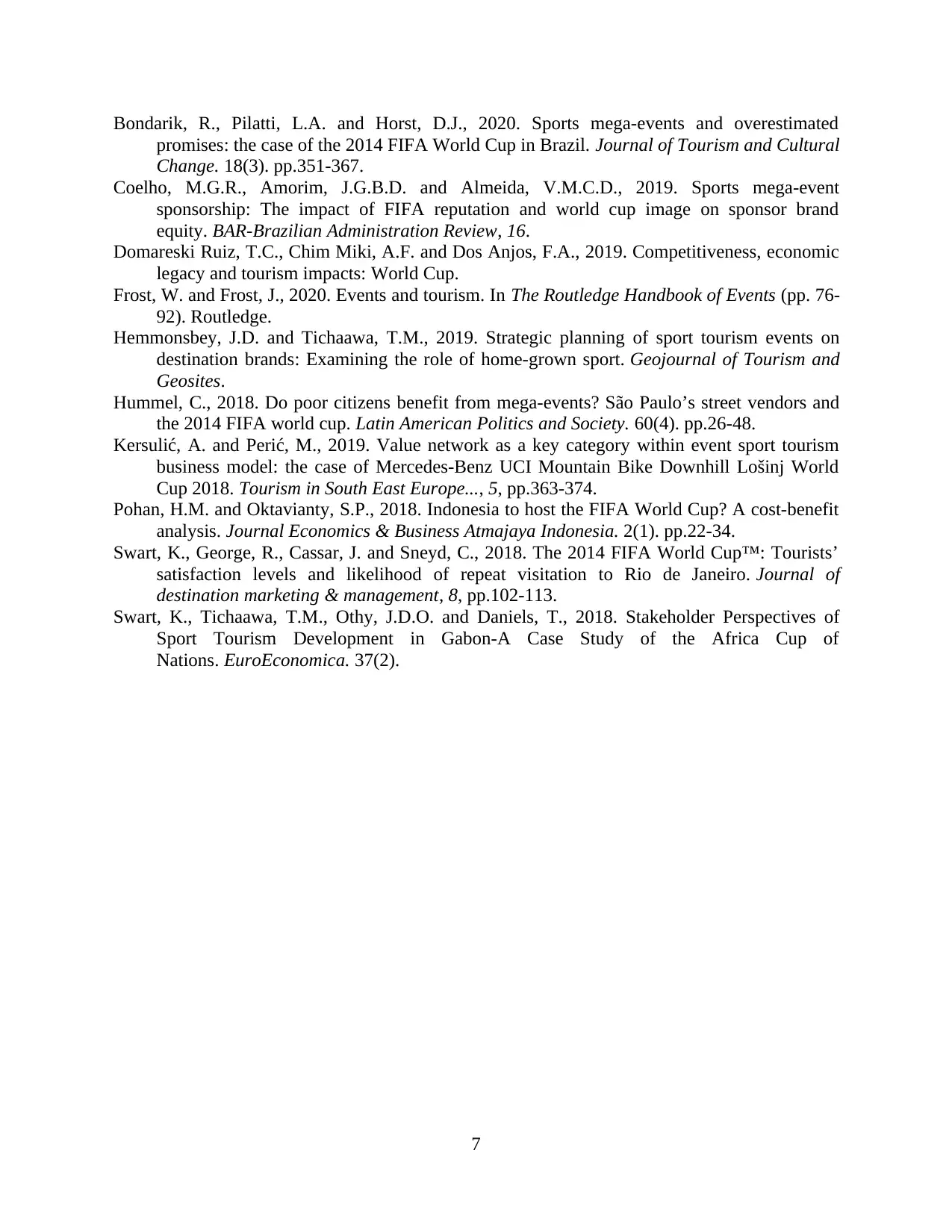
Bondarik, R., Pilatti, L.A. and Horst, D.J., 2020. Sports mega-events and overestimated
promises: the case of the 2014 FIFA World Cup in Brazil. Journal of Tourism and Cultural
Change. 18(3). pp.351-367.
Coelho, M.G.R., Amorim, J.G.B.D. and Almeida, V.M.C.D., 2019. Sports mega-event
sponsorship: The impact of FIFA reputation and world cup image on sponsor brand
equity. BAR-Brazilian Administration Review, 16.
Domareski Ruiz, T.C., Chim Miki, A.F. and Dos Anjos, F.A., 2019. Competitiveness, economic
legacy and tourism impacts: World Cup.
Frost, W. and Frost, J., 2020. Events and tourism. In The Routledge Handbook of Events (pp. 76-
92). Routledge.
Hemmonsbey, J.D. and Tichaawa, T.M., 2019. Strategic planning of sport tourism events on
destination brands: Examining the role of home-grown sport. Geojournal of Tourism and
Geosites.
Hummel, C., 2018. Do poor citizens benefit from mega-events? São Paulo’s street vendors and
the 2014 FIFA world cup. Latin American Politics and Society. 60(4). pp.26-48.
Kersulić, A. and Perić, M., 2019. Value network as a key category within event sport tourism
business model: the case of Mercedes-Benz UCI Mountain Bike Downhill Lošinj World
Cup 2018. Tourism in South East Europe..., 5, pp.363-374.
Pohan, H.M. and Oktavianty, S.P., 2018. Indonesia to host the FIFA World Cup? A cost-benefit
analysis. Journal Economics & Business Atmajaya Indonesia. 2(1). pp.22-34.
Swart, K., George, R., Cassar, J. and Sneyd, C., 2018. The 2014 FIFA World Cup™: Tourists’
satisfaction levels and likelihood of repeat visitation to Rio de Janeiro. Journal of
destination marketing & management, 8, pp.102-113.
Swart, K., Tichaawa, T.M., Othy, J.D.O. and Daniels, T., 2018. Stakeholder Perspectives of
Sport Tourism Development in Gabon-A Case Study of the Africa Cup of
Nations. EuroEconomica. 37(2).
7
promises: the case of the 2014 FIFA World Cup in Brazil. Journal of Tourism and Cultural
Change. 18(3). pp.351-367.
Coelho, M.G.R., Amorim, J.G.B.D. and Almeida, V.M.C.D., 2019. Sports mega-event
sponsorship: The impact of FIFA reputation and world cup image on sponsor brand
equity. BAR-Brazilian Administration Review, 16.
Domareski Ruiz, T.C., Chim Miki, A.F. and Dos Anjos, F.A., 2019. Competitiveness, economic
legacy and tourism impacts: World Cup.
Frost, W. and Frost, J., 2020. Events and tourism. In The Routledge Handbook of Events (pp. 76-
92). Routledge.
Hemmonsbey, J.D. and Tichaawa, T.M., 2019. Strategic planning of sport tourism events on
destination brands: Examining the role of home-grown sport. Geojournal of Tourism and
Geosites.
Hummel, C., 2018. Do poor citizens benefit from mega-events? São Paulo’s street vendors and
the 2014 FIFA world cup. Latin American Politics and Society. 60(4). pp.26-48.
Kersulić, A. and Perić, M., 2019. Value network as a key category within event sport tourism
business model: the case of Mercedes-Benz UCI Mountain Bike Downhill Lošinj World
Cup 2018. Tourism in South East Europe..., 5, pp.363-374.
Pohan, H.M. and Oktavianty, S.P., 2018. Indonesia to host the FIFA World Cup? A cost-benefit
analysis. Journal Economics & Business Atmajaya Indonesia. 2(1). pp.22-34.
Swart, K., George, R., Cassar, J. and Sneyd, C., 2018. The 2014 FIFA World Cup™: Tourists’
satisfaction levels and likelihood of repeat visitation to Rio de Janeiro. Journal of
destination marketing & management, 8, pp.102-113.
Swart, K., Tichaawa, T.M., Othy, J.D.O. and Daniels, T., 2018. Stakeholder Perspectives of
Sport Tourism Development in Gabon-A Case Study of the Africa Cup of
Nations. EuroEconomica. 37(2).
7
1 out of 11
Related Documents
Your All-in-One AI-Powered Toolkit for Academic Success.
+13062052269
info@desklib.com
Available 24*7 on WhatsApp / Email
![[object Object]](/_next/static/media/star-bottom.7253800d.svg)
Unlock your academic potential
Copyright © 2020–2026 A2Z Services. All Rights Reserved. Developed and managed by ZUCOL.





